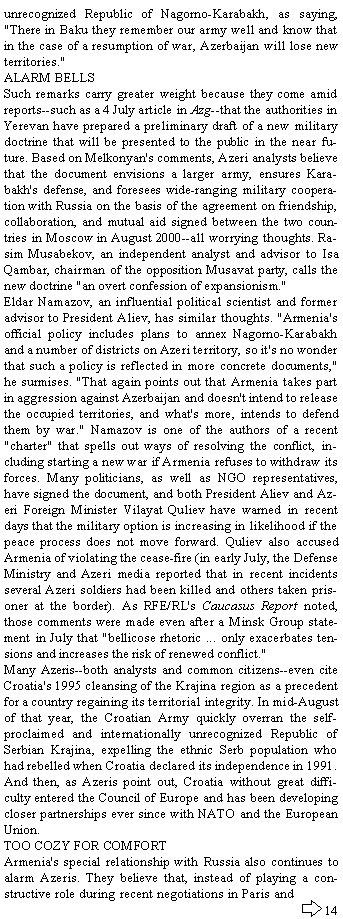|
Seymur Selimov: 8/24/01
A EurasiaNet Partner Post from Transitions Online
BAKU, Azerbaijan--In spite of steps forward taken by Armenian President Robert Kocharian and his Azeri counterpart Heidar Aliev earlier this spring, the mood on the ground remains belligerent.
A new round of meetings to end the conflict--stalemated since a May 1994 cease-fire agreement stopped a war that claimed more than 20,000 lives--was originally scheduled for June, but was postponed, mainly because the populations were deemed unready for compromise. But spurred on by combative exchanges between leaders in both countries, the stance of both Azeri politicians and the general population has hardened. That has made it even more difficult to even broach the issue of concessions and ignore the increasing demands to act militarily if the situation remains deadlocked.
Attempts so far to prepare the Azeri population for possible compromises have met with failure and resistance from across society. Earlier this year, the Azeri parliament brought up the suggestions made by the "Minsk Group"--the Organization for Security and Cooperation in Europe (OSCE) initiative co-chaired by the United States, France, and Russia--and highlighted possible compromises to be proposed to the population. The reaction was overwhelmingly negative. The great majority of the population is clearly not ready to, as they see it, sacrifice their national interests in the name of peace. In addition, few believe that any economic benefits from a deal will ever trickle down to them.
"On the whole, the Azeri side has lost 20 percent of its territory. We have about 1 million refugees. And I don't think that the occupiers will so simply return our land, because there is not a similar case in history," says historian Zemfira Guliyeva, echoing many of her peers. "Maybe it will be possible only under advantageous conditions for the enemy--of course [they] didn't begin this war in vain. I hope that the authorities and our people will not accept unfavorable conditions."
Though most Azeris view Armenia as well-armed and ready for action, talk of a military solution has become more concrete and determined in recent months. If earlier calls to increase military spending and preparation came mainly from the opposition in both countries, now such statements emanate from official circles and even defense ministries. Both sides boast of their military superiority, with some on both sides of the front-line believing a "quick, victorious war" is the only solution.
Recently, for example, in a 3 July interview published in the Armenian newspaper Azg, a reporter asked Defense Minister Mikael Melkonyan if he agreed with the statement that Karabakh's army is the strongest in the Transcaucasus. "Armenia's army, yes," he replied. "Our people perceive the military forces of our country and Karabakh's army as a unified whole ... Armenia is ready to defend Karabakh by force of arms." He also mentioned Armenia's interest in continuing to host Russian military bases. And on 6 July, the Mediamax news agency quoted Arkady Ghukasian, the president of the
|
|
